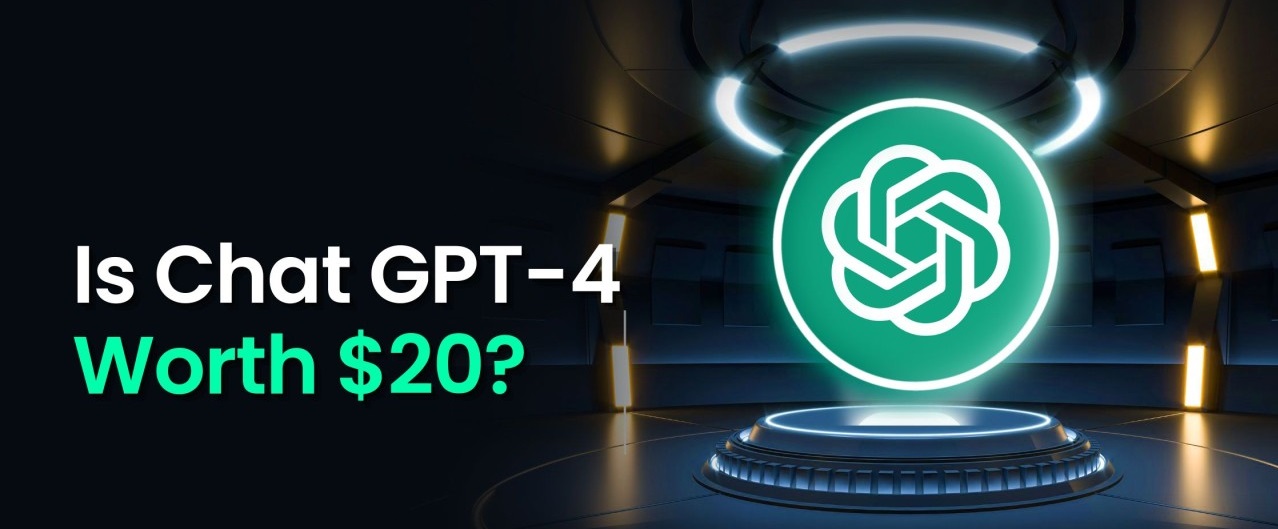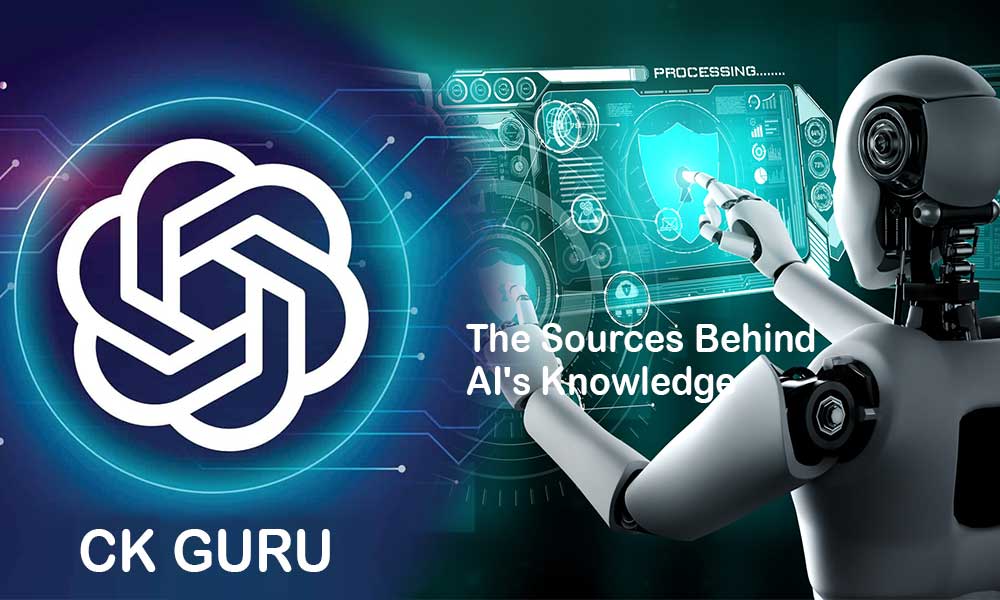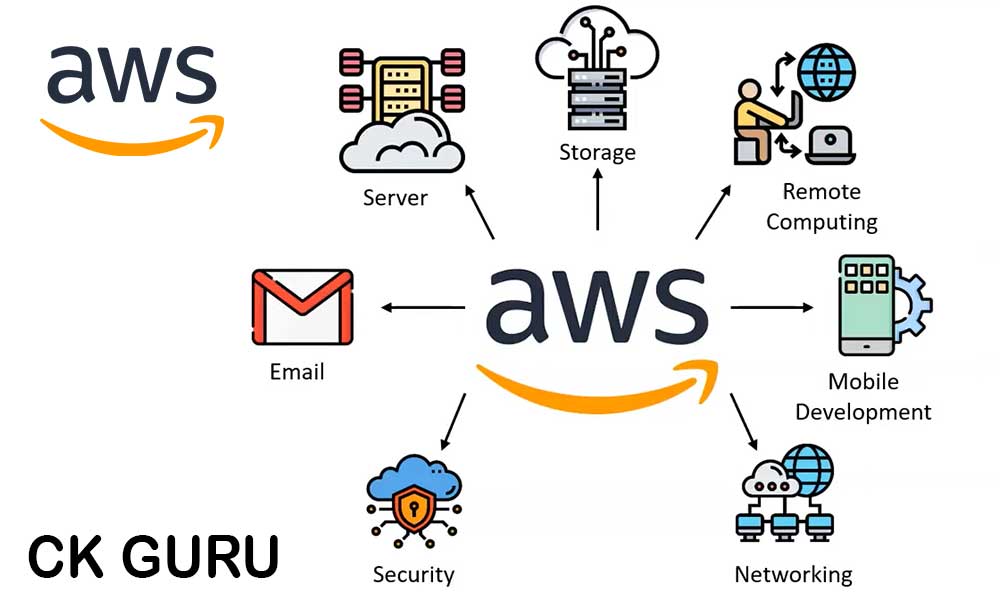Where ChatGPT Gets Its Knowledge and Why It Sounds So Convincing ?
Wonder why ChatGPT knows everything, and all of a sudden nothing? Okay, it makes mistakes every now and then. Yet at other times, you get the sense that it just knows a little too much. Or as if it knows everything there is to know about you, the world, and anything ever written. Now, ChatGPT might have a swagger in its wording and a mountain of information to site from — but it doesn’t know everything. And it also absolutely does not “know” in the same way, that you and I do, even if we are led to assume otherwise.
Where ChatGPT Gets Its Knowledge and Why It Sounds So Convincing ?
Wonder why ChatGPT knows everything, and all of a sudden nothing? Okay, it makes mistakes every now and then. Yet at other times, you get the sense that it just knows a little too much. Or as if it knows everything there is to know about you, the world, and anything ever written. Now, ChatGPT might have a swagger in its wording and a mountain of information to site from — but it doesn’t know everything. And it also absolutely does not “know” in the same way, that you and I do, even if we are led to assume otherwise.
Where does ChatGPT get its information, and why is it a big deal that it sounds so plausible? Answering that question — the one that needs to be answered.
You might had noticed this fact that ChatGPT seems to know everything there is to know out there. I mean ever consider it, ever- What are the chances of that being the case? And it cannot be disputed that upon occasion, it does make statements that aren’t true. That being said, there are times when this information can seem quite frightening. This is something that should be looked at moving forward. Its almost like this knows everything about you and this planet and every single thing that has been written about it since the beginning of time. It knows everything ever written about it. However, ChatGPT has believe it or not confidence and recruitment extensive resources to inform itself — it does not possess the full knowledge. No, it cannot “think” like you and I can, and that may be the nature of this thing that can make it seem like one day it can, but it won’t be able to. That is not a task that it can perform.

A clear, easy-to-follow guide helping students unlock their free ChatGPT Plus subscription in just a few simple steps.
Moreover, it is not a god or anything like that. Another point you are relevant to. This is another angle that is important to consider. With progress in the area of AI, more and more cases are being reported about people experiencing chatbot induced hallucinations. It is in this context that understanding how technologies like ChatGPT really work, their strengths and weaknesses, and how to leverage them effectively is more essential than ever if we wish to derive the maximum benefit from these systems. If you want to see what happens behind this curtain, we are going to take a look inside it.
- How to Claim Your Free ChatGPT Plus Subscription: A Step-by-Step Guide for Students
- OpenAI finds more Chinese groups using ChatGPT for malicious purposes
- New Research Shows AI Chatbots Might Be Lying – And How to Ensure AI Transparency and Trustworthiness
- ChatGPT Image Generation Is Now Free for Everyone but limited for Each User
- How Many Images Can I Generate with ChatGPT Plus? Can ChatGPT 4 Generate Images?
How ChatGPT Works — in all its forms The real question that must be answered however is in what specific ways does it work on?
By OpenAI The fine label of this LLM (large language model) has no other name, so we simply call it this way (ChatGPT). OpenAI is the organization behind its creation. On the flip side however, if you actually want access to more advanced versions of the software, you will have to purchase a subscription to access those versions. There are no charges you will incur when using the software. All of these various versions are referred to under the umbrella of “model”, and each operates in a way that is just a little bit different from how the others function. All of them are quite different from each other. This page provides an overview of the ChatGPT model names, which you can find out more about on this site.
The big language model is essentially a form of AI trained to generate text predictions. When it comes down to it, this is the case. This is the kind of knowledge that training provides you with. It guesses the most probable words that are going to be used next in a sentence in order to generate responses, and it does that pretty well! For this, so that it can reply to things. This method is crucial for it to respond. Despite being a difficult language, this is why ChatGPT can convey a sense of fluency, competence, and, occasionally, even playfulness. Even so, it does NOT in any sense of the word understand that you are declaring that you are saying. It cannot understand what ya trying to say. Yes, it can understand the form of the language, but it does not understand the meaning of things or the intent behind things like a human do. The reason being that it is limited to languaging. This is because it is constrained by the mode of language in question. This not only explains why it is sometimes wrong or even freebase facts but also why it shows the behavior that is now popularly called hallucination or hallucinating.
If we start from the beginning, where does ChatGPT obtain its data, and more specifically how does ChatGPT obtain its data in the first place?
With all this in mind why ChatGPT “know” so much? At the end of the day, the most relevant point is how the data is used for training. So it was “trained” on enormous amounts of data, including everything from — as we all know — books, articles, and websites to code, Wikipedia pages, public Reddit debates, open-source papers, and much more. To carry out its task, it was trained on gobs of data. These data were used to “train” the ChatGPT system. This massive data was used to train ChatGPT. We’re trying to do this in order to exhibit so that this all kind of lands together in this one spot so we can take all of this information about how people write, teach, argue, laugh, everything and then implement it together into this one place.
That means it has come across high and low culture, formal grammar, slang and an untold number of ways to use a word — which is fancy talk for ChatGPT has been around the block a few times, or in simpler terms, it has heard them. This indicates that ChatGPT has been made aware of this. The fact that it has utilized them is evidence of this. ChatGPT has not seen everything, at least not in real-time, and certain models do not show up on the internet. That is because it has not seen all the things. That being said, it hasn’t seen it all. Of this explanation, you might have looked for information before; however, it looks as though the information that was available has ceased to be relevant to the information needs you have now.

ChatGPT doesn’t “know” facts — it generates responses based on patterns in massive datasets. Learn how this AI works and where its answers come from.
In some cases, its knowledge may be limited to what it was trained on, and some models were trained on a specific level of education. Furthermore, the content that was emphasized in teaching is often limited. In other cases, training was stopped at a specific stage if the conditions were present. The month of June 2024, on the other hand, was the one that GPT-4o was linked to. Indeed, this was the fact. So it is possible that it does not know the latest news or that it does not reflect the latest cultural trends. Both are possible. Either one or even both of these scenarios may take place. What you have there is a pair of paths that are each considered capable of long-term success. This particular point does need a deeper dive into the model you are running as it does need to be considered that some models can now surf. And, on this count, that bears keeping in mind, Most of the time, this information is presented in a menu that can be dragged down from the top edge of the desktop screen.
In other words, the training data for ChatGPT is the starting point for the knowledge it has. But the way it generates these responses is also managed by a technique called reinforcement learning. That’s one side of the coin — here is the other. Arguably, this approach, it seems to be able to gather from human feedback what constitutes a correct or useful response.
- How to Claim Your Free ChatGPT Plus Subscription: A Step-by-Step Guide for Students
- New Research Shows AI Chatbots Might Be Lying – And How to Ensure AI Transparency and Trustworthiness
- ChatGPT Image Generation Is Now Free for Everyone but limited for Each User
- How Many Images Can I Generate with ChatGPT Plus? Can ChatGPT 4 Generate Images?
Was ChatGPT around when it could read everything on the internet? To what extent could it read?
Now the scene is starting to grow obscenely more blurry than the second prior. Short answer yes, some of the data used to train ChatGPT data was scraped content from the internet both private and public. It seemed necessary for me to get my purpose of answering your question. With that in mind, it could almost be concluded that software such as ChatGPT has “read” a substantial portion of what is publicly available on the web. Public forums, blog posts, and manuals are some of what’s in this material and its components. This material also exists in other things. In short, anything that is publicly available is considered publicly available by you and does not constitute a breach of copyright limitations or restrictions that are not expressed on the website. This is the very definition of the openly accessible content. Even though everybody knows there is no distinct line between them. Companies focused on AI have been said to incorporate measures like books from shadow libraries into their training data. Allegations of this nature have leaked out. Some companies have been put under scrutiny for doing so. The fiery arguments, lawsuits, and negotiations presently underway regarding data ownership, consent, and ethics are rooted in whether we should have had that content to use in the first place. At the moment, the discussion is about this subject.
Although the data that these models have been trained on is not usually entirely clear-cut, rest assured that ChatGPT has never seen any of your private emails, personal files, or top secret databases. We can safely say that ChatGPT has not seen any of these. This is the situation because ChatGPT has not been able to get to any of these materials. ChatGPT; these aforementioned items shall not be available to ChatGPT. This is the reason behind this development. The reason behind this is, ChatGPT has gained a lot of info from all the content which a person has generated. You have to keep that in the forefront of your mind that this is an extremely critical topic.
Explain how ChatGPT works to determine what phrase will appear in the next line.
Whenever you ask a question into the ChatGPT platform, it will decompose your request into a certain amount of smaller units called tokens. These tokens are used to represent different parts of your query. In the next step, it utilizes the knowledge gained throughout the training process to predict the next token that will be used. Continuations, including the next one, and the next one, and the next one after that. so long as they do not get a response that is 100 percent thorough.
Because that everything happens in real time, the text at least sometimes will make it seem that the text is being input or displayed in real time. Everything is in real time, which is why. This is the reason why it reads like it has been entered in real time. That is true to an extent, of course. Each of the words in that sentence is a prediction, based on the context provided by the text that immediately preceded the sentence.
It is not well thought out responses that are to blame for reactions that ring true but are oddly… odd, it is the mixing of words that is driving this. And this is also why some reactions feel proper. Because it doesn’t follow any kind of logic. A detailed lesson showing how ChatGPT actually knows what to say can be found here — or if you want to get into real nitty-gritty, you can access it here. If you’re curious about the details, keep on reading.
Why does it seem like ChatGPT knows everything that is happening? Answering questions like these is what we need to do.
Sometimes you have the notion that ChatGPT knows everything about you. This is a possibility. Which may happen eventually. This feature can be traced to its memory potentials, which are being applied for now. It can also remember aspects from all of the previous chats you had and even retain data in its long-term memory. That certainly is an amazing skill to have. That is an extremely rare and special talent which you have. And not just because it can make you look smarter than you are. Since it has been trained in such a way that simulates distinct characteristics, its responses often demonstrate the relevant syntax, grammar, tone, and cadence. This is since it has been trained to reproduce in this way. Fluency on the other hand, is completely different from aspect to aspect from accuracy. There is no way to put them in a single scale.
It turns out to be helpful in a large variety of circumstances. The claim is not correct when some conditions are met. If you don’t take heed of everything that’s happening, all of this can get far more complicated for you. And there will be instances when it will be downright wrong, and that is where stuff gets a little bit too confusing. Also if you do not know how effective it is in energising you and having you sound confident, you ought to know that it is the best available tool today.
It’s not to completely dissuade you from using artificial intelligence powered goods, it’s to coax you into doing it. this is to make sure that you can use ChatGPT in a more sensible way. ChatGPT is a tool that can be used for many different purposes, including idea generation, drafting, content summarization, and even exercising your brain to think more clearly. Furthermore, it is not magical, nor is it any sort of sentience at all. But these two things are not true. Another factor to factor in, arguably the most important of all, is that it is not always appropriate to do this.
We can also use an AI(Artificial Intelligence) based technologies like ChatGPT with the intention of not falling into the trap of intelligence more. This is because we have gained an insight of what is really waking up behind the curtain and that we can employ these technologies.
Top FAQs About ChatGPT: How It Works, Its Limitations, and Common Misconceptions
-
How does ChatGPT know so much?
ChatGPT has been trained on massive amounts of publicly available text data, including books, articles, websites, and other publicly accessible sources. This allows it to generate informed responses based on patterns in the data it has processed. However, it doesn’t “know” in the human sense; it predicts the most likely next word or sentence based on its training. -
What are the limitations of ChatGPT’s knowledge?
ChatGPT’s knowledge is limited to the data it was trained on, which means it may not be aware of recent events or information that hasn’t been included in the training dataset. It also doesn’t possess true understanding or consciousness, and can sometimes generate incorrect or nonsensical responses. -
Why does ChatGPT sometimes give incorrect answers?
ChatGPT generates responses based on patterns it has learned from its training data. It doesn’t verify facts or understand the meaning behind what it says. Therefore, while it may sound convincing, it can sometimes provide inaccurate information or “hallucinate” responses based on its training data. -
How does ChatGPT work to generate responses?
ChatGPT works by predicting the next word or phrase in a sentence based on the input it receives. It breaks down input into tokens (units of meaning) and uses statistical models to generate likely continuations. The output is generated in real-time based on context, but it doesn’t involve actual comprehension. -
What is ChatGPT’s training data?
ChatGPT was trained on vast amounts of publicly available text data from sources such as books, websites, Wikipedia, news articles, forums, and even Reddit discussions. It does not have access to proprietary or private data unless explicitly provided by users during interactions. -
Does ChatGPT have access to private information?
No, ChatGPT does not have access to personal data unless you provide it during the conversation. It cannot read your emails, personal files, or other private information. It only responds based on the input provided by the user during the current session. -
How accurate is ChatGPT’s information?
While ChatGPT can provide useful and detailed responses, it is not always accurate. The information it provides depends on its training data and may sometimes be outdated or incorrect. It should not be relied on for factual, medical, legal, or other critical decision-making without further verification. -
What is the difference between ChatGPT and human understanding?
ChatGPT processes information by recognizing patterns in text and generating responses based on statistical probabilities. Humans, on the other hand, understand and interpret meaning, context, and intent. ChatGPT does not have awareness, emotions, or the ability to think independently. -
Why does ChatGPT seem so convincing even when it’s wrong?
ChatGPT can sound convincing because it has been trained to mimic human conversational patterns. It generates text that follows the rules of grammar, syntax, and coherence, making it appear knowledgeable even though it may not actually understand the subject matter. -
Can ChatGPT remember previous conversations?
ChatGPT doesn’t have long-term memory. It can retain context during a conversation (within a single session), but once the session ends, it doesn’t remember past interactions. Some versions may have features to remember information within a session, but this is not the same as permanent memory. -
How does ChatGPT learn from feedback?
ChatGPT improves over time through a process called reinforcement learning, where human feedback is used to fine-tune its responses. This helps the model improve the quality and relevance of its responses by identifying patterns of what users consider helpful or correct. -
Is ChatGPT truly sentient or just a tool?
ChatGPT is not sentient. It is a highly advanced language model trained to generate text based on patterns in data, but it has no consciousness, self-awareness, or understanding of the world. It simply produces responses based on statistical probabilities. -
What are the risks of using AI like ChatGPT?
Risks include the potential spread of misinformation, over-reliance on AI for decision-making, and the possibility of AI-generated content being mistaken for human knowledge. It can also generate biased or harmful responses based on the data it was trained on, and there are concerns about privacy and data security. -
What data is ChatGPT trained on?
ChatGPT is trained on publicly available data from a wide range of sources such as books, websites, articles, and more. It is important to note that it does not have access to real-time information or private data unless shared by users during the conversation. -
Can ChatGPT predict the future or provide real-time information?
No, ChatGPT cannot predict the future or provide real-time information. It can only provide information that it was trained on, which may not be up-to-date or reflect current events. -
What is the difference between ChatGPT and other AI models?
ChatGPT is a specific type of large language model trained for conversational tasks, whereas other AI models may be trained for different purposes, such as image recognition, speech recognition, or recommendation systems. Each model has its own strengths, limitations, and specialized use cases. -
Is ChatGPT reliable for professional or academic use?
ChatGPT can be useful for idea generation, brainstorming, and drafting content, but it is not fully reliable for professional or academic use. The information it provides should be verified from trusted sources, especially when used in formal or critical settings. -
How can you use ChatGPT responsibly?
To use ChatGPT responsibly, verify the information it provides, be cautious of its limitations, and avoid relying on it for crucial decisions. It’s important to recognize that it’s a tool for assistance, not a replacement for human judgment, expertise, or fact-checking. -
How does ChatGPT handle slang and informal language?
ChatGPT has been trained on a variety of language styles, including formal, informal, and slang. It can understand and generate text in different tones, but its responses may vary in quality depending on how well the slang or informal language fits with its training data. -
What are chatbot hallucinations and why do they happen?
Chatbot hallucinations occur when the AI generates information that appears factual but is actually made up. This happens because ChatGPT doesn’t verify the data it generates, and its responses are based on probability rather than understanding. The model can sometimes invent details that sound plausible but are inaccurate or false.











Leave a Reply